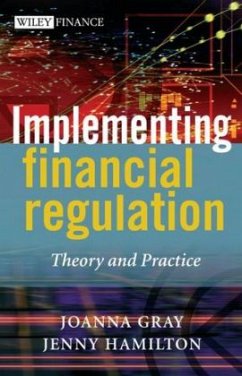Now that the Financial Services and Markets Act 2000 has had a chance to bed itself down and the FSA is developing its new regulatory toolkit and modus operandi, financial regulation has moved on in interesting directions. Implementing Financial Regulation: Theory and Practice fills the need for a discursive book that takes a critical look at the principles behind and practice of this regulation as well as looking at the academic theory involved. This is the first book to analyze the impact and implications of the new financial regulations rather than just stating what laws and rules are.
Implementing Financial Regulation: Theory and Practice examines the most important aspects of the UK financial regulatory environment introduced by the Financial Services and Markets Act 2000. These aspects are firstly, the move towards risk-based regulation and in particular FSA's risk-based operating framework for supervision; secondly, the trend towards direct regulation of individuals within financial services businesses and in particular senior managers; and thirdly how regulatory rhetoric and action have changed over the last twenty years to mirror the re-drawing of the boundary between collective and personal responsibility that has led to increasing emphasis on financial citizenship and personal financial autonomy that has taken place over the same period. Highlights include:
_ What does (and should) risk-based regulation mean? How does FSA interpret and use conceptions of "risk"?
_ How FSMA 2000 and the FSA Handbook have built a bespoke governance regime for the finance sector regulatory apparatus governing senior management responsibility, arrangements, systems and controls?
_ How is the regulatory regime with its increased emphasis on issues internal to the business of governance, organisation and performance by key individual staff being made to "bite" at the level of FSA enforcement against firms and individuals?
_ Can regulation and regulators employ their techniques to empower and enable individual financial citizens to make rational choices faced with a dizzying array of (increasingly directly regulated) products and services?
The book aims to explain and critique each of these features in terms of broader trends in thinking and practice about regulation and the appropriate individual allocation of risk and governance responsibilities in some other areas of business law. It asks whether insights provided by social theorists into both the possibilities and limits of regulation can aid understanding of some of these more novel features of the UK financial regulatory landscape.
Implementing Financial Regulation: Theory and Practice examines the most important aspects of the UK financial regulatory environment introduced by the Financial Services and Markets Act 2000. These aspects are firstly, the move towards risk-based regulation and in particular FSA's risk-based operating framework for supervision; secondly, the trend towards direct regulation of individuals within financial services businesses and in particular senior managers; and thirdly how regulatory rhetoric and action have changed over the last twenty years to mirror the re-drawing of the boundary between collective and personal responsibility that has led to increasing emphasis on financial citizenship and personal financial autonomy that has taken place over the same period. Highlights include:
_ What does (and should) risk-based regulation mean? How does FSA interpret and use conceptions of "risk"?
_ How FSMA 2000 and the FSA Handbook have built a bespoke governance regime for the finance sector regulatory apparatus governing senior management responsibility, arrangements, systems and controls?
_ How is the regulatory regime with its increased emphasis on issues internal to the business of governance, organisation and performance by key individual staff being made to "bite" at the level of FSA enforcement against firms and individuals?
_ Can regulation and regulators employ their techniques to empower and enable individual financial citizens to make rational choices faced with a dizzying array of (increasingly directly regulated) products and services?
The book aims to explain and critique each of these features in terms of broader trends in thinking and practice about regulation and the appropriate individual allocation of risk and governance responsibilities in some other areas of business law. It asks whether insights provided by social theorists into both the possibilities and limits of regulation can aid understanding of some of these more novel features of the UK financial regulatory landscape.








